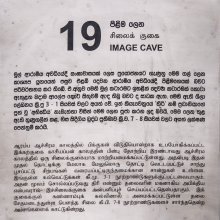Tiri, Tirī: 5 definitions
Introduction:
Tiri means something in Hinduism, Sanskrit, Marathi, Jainism, Prakrit, biology, Tamil. If you want to know the exact meaning, history, etymology or English translation of this term then check out the descriptions on this page. Add your comment or reference to a book if you want to contribute to this summary article.
Images (photo gallery)
Biology (plants and animals)
Source: Google Books: CRC World Dictionary (Regional names)Tiri in India is the name of a plant defined with Allium sativum in various botanical sources. This page contains potential references in Ayurveda, modern medicine, and other folk traditions or local practices It has the synonym Porrum ophioscorodon Rchb. (among others).
Example references for further research on medicinal uses or toxicity (see latin names for full list):
· Gardeners Dictionary, ed. 8
· Species Plantarum (1753)
If you are looking for specific details regarding Tiri, for example side effects, extract dosage, chemical composition, diet and recipes, health benefits, pregnancy safety, have a look at these references.

This sections includes definitions from the five kingdoms of living things: Animals, Plants, Fungi, Protists and Monera. It will include both the official binomial nomenclature (scientific names usually in Latin) as well as regional spellings and variants.
Languages of India and abroad
Marathi-English dictionary
Source: DDSA: The Molesworth Marathi and English Dictionarytirī (तिरी).—f tirūka m Terms in the games with songṭya.
Marathi is an Indo-European language having over 70 million native speakers people in (predominantly) Maharashtra India. Marathi, like many other Indo-Aryan languages, evolved from early forms of Prakrit, which itself is a subset of Sanskrit, one of the most ancient languages of the world.
Sanskrit dictionary
Source: Cologne Digital Sanskrit Dictionaries: Monier-Williams Sanskrit-English DictionaryTīrī (तीरी):—[from tīra] f. idem, [cf. Lexicographers, esp. such as amarasiṃha, halāyudha, hemacandra, etc.]
Sanskrit, also spelled संस्कृतम् (saṃskṛtam), is an ancient language of India commonly seen as the grandmother of the Indo-European language family (even English!). Closely allied with Prakrit and Pali, Sanskrit is more exhaustive in both grammar and terms and has the most extensive collection of literature in the world, greatly surpassing its sister-languages Greek and Latin.
Prakrit-English dictionary
Source: DDSA: Paia-sadda-mahannavo; a comprehensive Prakrit Hindi dictionaryTiri (तिरि) in the Prakrit language is related to the Sanskrit word: Tiryak.
Tiri has the following synonyms: Tiria.
Prakrit is an ancient language closely associated with both Pali and Sanskrit. Jain literature is often composed in this language or sub-dialects, such as the Agamas and their commentaries which are written in Ardhamagadhi and Maharashtri Prakrit. The earliest extant texts can be dated to as early as the 4th century BCE although core portions might be older.
Kannada-English dictionary
Source: Alar: Kannada-English corpusTiri (ತಿರಿ):—
1) [verb] to walk, go or travel without a fixed purpose or direction; to wander.
2) [verb] to ask for alms; to beg.
3) [verb] to twine a) to twist together; intertwine; b) to form by twisting, intertwining.
--- OR ---
Tiri (ತಿರಿ):—
1) [verb] to pluck (flowers, fruits etc.) from plants.
2) [verb] to cause to fly through the air by releasing from the hand (as to fall at a distance); to throw; to hurl; to cast.
--- OR ---
Tiri (ತಿರಿ):—
1) [noun] a twisted thread or rope.
2) [noun] (dial.) a container-like structure made by twisted hay for storing paddy and other grains.
--- OR ---
Tīri (ತೀರಿ):—[noun] a slender, straight, usu. pointed, missile made to be shot from a bow and equipped with feathers at the end of the shaft near the nock, for controlling flight; an arrow.
Kannada is a Dravidian language (as opposed to the Indo-European language family) mainly spoken in the southwestern region of India.
See also (Relevant definitions)
Starts with (+282): Tiri-cirapalli, Tiri-culamuttirai, Tiri-ekakatavul, Tiri-itti-canni, Tiri-kala-varttamanam, Tiri-kalananam, Tiri-konacastiram, Tiri-kuta-racappa-kavirayar, Tiri-mantalacilanti, Tiri-pakainam, Tiri-palaienati, Tiri-patviputi, Tiri-puvanatilakam, Tiri-tantacanniyaci, Tiri-vikkiramaracam, Tiria, Tiria, Tiria, Tiriakphala, Tiriamca.
Ends with (+253): Accattiri, Acuramantiri, Aka-patacuttiri, Akacakattiri, Akayakkattiri, Ammapattiri, Antiri, Apimanastiri, Araneri-cantekacastiri, Arttarattiri, Aspattiri, Atiri, Attiri, Auttiri, Avarattiri, Bhudhatiri, Bilpattiri, Caciyatitappattiri, Cakatattiri, Calastiri.
Full-text (+98): Tiria, Tiri-tantacanniyaci, Tirige, Melukuttiri, Tiritanti, Tirijihvika, Tiri-palaienati, Tirikantaki, Tiri-itti-canni, Tiripakam, Tiricanti, Tirilocani, Cekkil-vaittutiri, Tirikantakam, Tiricamam, Tirirattiri, Tirippalam, Tirikatuku, Tirilocanan, Tirivattam.
Relevant text
Search found 3 books and stories containing Tiri, Tirī, Tīrī, Tīri; (plurals include: Tiris, Tirīs, Tīrīs, Tīris). You can also click to the full overview containing English textual excerpts. Below are direct links for the most relevant articles:
Trishashti Shalaka Purusha Caritra (by Helen M. Johnson)
Appendix 3.2: new and rare words < [Appendices]
Pallava period (Social and Cultural History) (by S. Krishnamurthy)
Depiction of Fauna < [Chapter 4 - Material Culture of the People]
The Tamil Academy: A Myth < [November, 1928]

